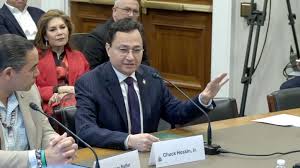Guest Opinon. As the largest tribe in the United States, Cherokee Nation has the responsibility to be an advocate and leader for all of Indian Country. That means engaging with the U.S. Congress and other federal leaders in Washington, D.C.

Cherokee engagement is especially important in times of transition. We can provide a stable, nonpartisan perspective on tribal sovereignty and the well-being of our 470,000-plus citizens across the country.
I recently testified before the before the U.S. House Appropriations Committee, chaired by Okla. Rep. and Chickasaw Nation citizen Tom Cole, to share priorities that will ensure Cherokees families remain safe and healthy. At a time when federal programs are being scrutinized, we must emphasize the essential need to keep up the U.S government’s trust and treaty responsibilities to Native nations.
With every dollar for tribal health care held dear, I called on Congress to reject duplicative funding lines and provide strong oversight for Purchased and Referred Care and the Joint Venture Construction Program. These ensure patients in our health system can get the referrals they need, and Cherokee Nation can continue building world-class health centers to replace long-neglected federal facilities.
I also spoke on the need for continued direct funding for tribal justice programs, necessary to maintain stability and the rule of law following the McGirt decision, which reaffirmed reservation boundaries in eastern Oklahoma. Equally important, I encouraged continuing investment in the revitalization of Native languages, which for the Cherokee Nation is the foundation of our cultural identity.
Cherokee Nation’s commitment to strong government-to-government relationships extends beyond congressional testimony. We also routinely engage with federal agencies and cabinet leaders, such as on the U.S. Health and Human Services Secretary’s Tribal Advisory Committee (HHS STAC), on which I was proud to be appointed for a new term as Oklahoma-area Delegate.
At the recent meeting, the first with newly appointed HHS Secretary Robert F. Kennedy Jr., I spoke on the need to protect Indian Health Service staff, avoid cuts to Medicaid coverage, and how we can work collaboratively on the Secretary’s priorities, such as food sovereignty and preventing chronic disease.
As we navigate this era of change, the Cherokee Nation remains a calm, guiding force. We have seen many ups and downs as a nation, but through it all we have approached our challenges with practicality and perseverance. Along with Deputy Chief Bryan Warner and the Council of the Cherokee Nation, we stand firm in our commitment to serve our people and ensure the federal government honors its responsibilities to Indian Country.
Chuck Hoskin, Jr. is the principal chief of the Cherokee Nation.
More Stories Like This
What Michigan Owes Its Tribal NationsBuilding a Stronger Nation Through Service
Is Oil Worth More Than Water?
Tribal Economic Development Programs in the Federal Contracting Environment: What They Are, and What They Are Not
Why Redefining Public Health Degrees Would Harm Native and Rural Communities
Help us defend tribal sovereignty.
At Native News Online, our mission is rooted in telling the stories that strengthen sovereignty and uplift Indigenous voices — not just at year’s end, but every single day.
Because of your generosity last year, we were able to keep our reporters on the ground in tribal communities, at national gatherings and in the halls of Congress — covering the issues that matter most to Indian Country: sovereignty, culture, education, health and economic opportunity.
That support sustained us through a tough year in 2025. Now, as we look to the year ahead, we need your help right now to ensure warrior journalism remains strong — reporting that defends tribal sovereignty, amplifies Native truth, and holds power accountable.
 The stakes couldn't be higher. Your support keeps Native voices heard, Native stories told and Native sovereignty defended.
The stakes couldn't be higher. Your support keeps Native voices heard, Native stories told and Native sovereignty defended.
Stand with Warrior Journalism today.
Levi Rickert (Potawatomi), Editor & Publisher

